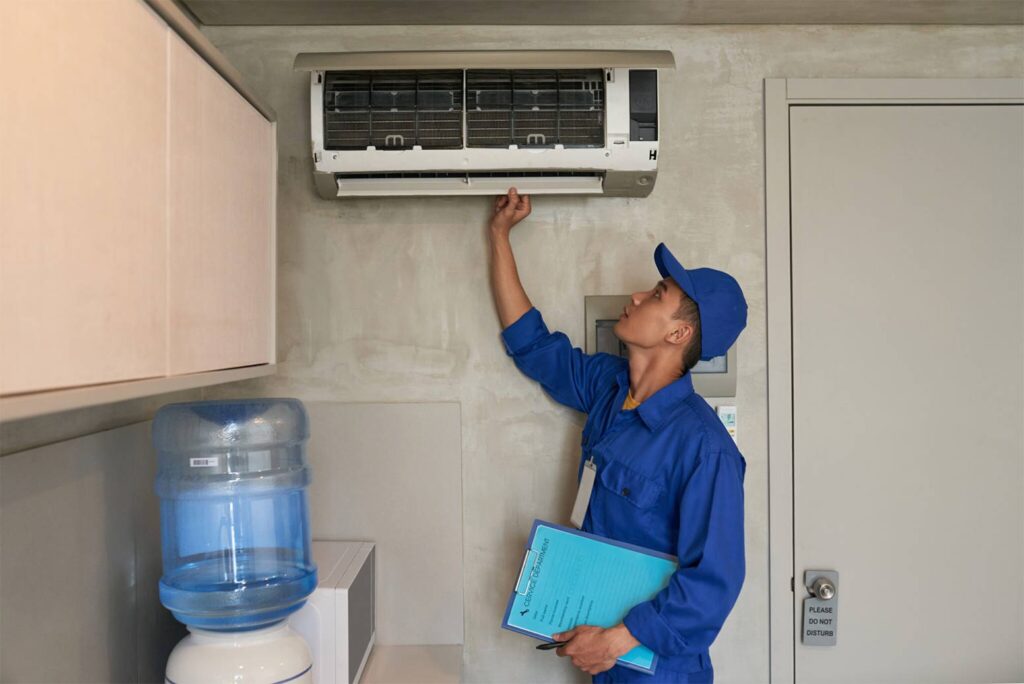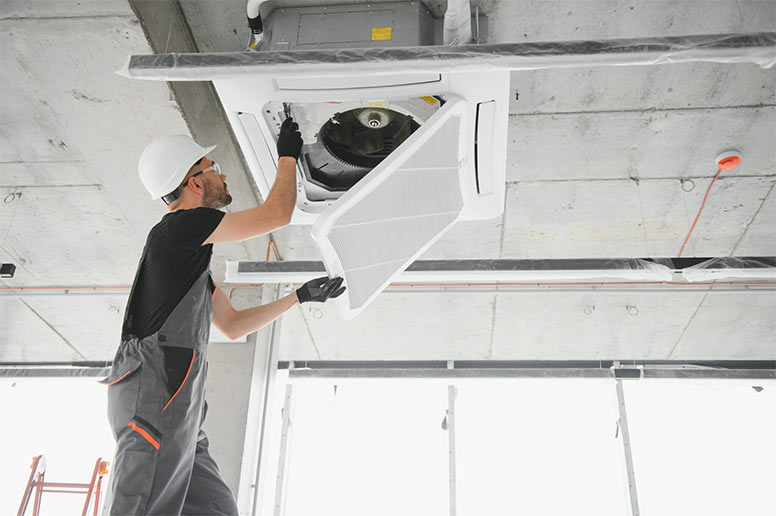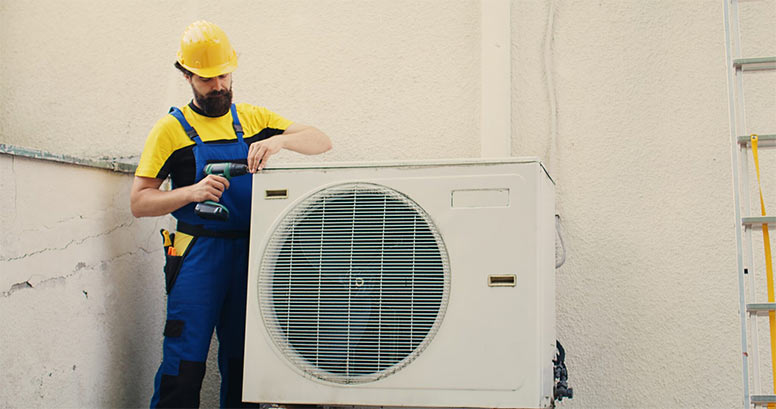How to Get your HVAC License

Table of Contents
In this article we will cover the steps needed in order to get your HVAC License in 2025, in the United States, covering State by State.
The Ventilating and Air Conditioning Industry is growing fast, with no signs of it slowing down. Now is a great time to get started with the demand for energy-efficient systems growing.
Heating, ventilation, and air conditioning contractors (HVAC) are in high demand. On average, technicians can earn around $59,620 a year, but as you gain experience and certifications, that number can jump significantly.
The truth is, being licensed opens the door to better jobs, higher pay, and more opportunities to grow your HVAC Business.
This guide is here to make the process easier for you. We’ll walk through what it takes to get licensed in each state, plus share tips to help you navigate the exams and requirements.
Let’s break it down so you can get started on the right foot.
Why Is HVAC Licensing Important?
Obtaining the proper type of HVAC license is crucial for several reasons:
- Legal Compliance: Most states mandate licensing to ensure contractors meet specific standards, protecting both professionals and consumers.
- Professional Credibility: A license demonstrates your skills and commitment to industry standards, enhancing client trust.
- Liability Protection: Licensed contractors are typically required to carry insurance, which safeguards against potential legal and financial issues arising from work-related incidents.

General HVAC Licensing Requirements
While each state has unique criteria, common requirements often include:
- You need to be at least 18 years old.
- EPA Section 608 Certification: Mandatory for handling refrigerants, as per the U.S. Environmental Protection Agency.
- Education and Training: Completion of accredited HVAC apprenticeship programs or community colleges.
- Work Experience Requirements: Documented field experience, varying by state.
- Examinations: Passing state-specific trade and business law exams.
- Insurance Requirements: Proof of general liability insurance coverage and, in some cases, bonding.
State-by-State HVAC Licensing Requirements
Below is a comprehensive table outlining the licensing requirements for HVAC professionals in each state.
State | Licensing Authority | Requirements | Renewal Period |
Alabama | Alabama Board of Heating, Air Conditioning, and Refrigeration Contractors | Pass exam, proof of insurance | Annually |
Alaska | State-approved training, exams | Every 2 years | |
Arizona | HVAC License (KA or KB), four years of experience | Every 2 years | |
Arkansas | Arkansas HVAC-R Licensing Board | Pass exam, proof of insurance, experience | Annually |
California | Contractors State License Board (CSLB) | C-20 license, four years of experience, bond | Every 2 years |
Colorado | Department of Regulatory Agencies | Local requirements (no state-wide license) | Varies |
Connecticut | Department of Consumer Protection | Limited and unlimited licenses, exam, experience | Annually |
Delaware | HVACR license, exam, insurance | Every 2 years | |
Florida | Florida Department of Business and Professional Regulation (DBPR) | Four years of experience, exams | Every 2 years |
Georgia | State Licensing Board for Residential and General Contractors | Conditioned air contractor license, proof of insurance | Every 2 years |
Hawaii | Department of Commerce and Consumer Affairs | C-52 HVAC license, trade and law exams | Every 2 years |
Idaho | Division of Building Safety | HVAC journeyman or contractor license, exam | Annually |
Iowa | Department of Inspections, Appeals and Licensing | HVAC license, EPA 608 certification | Annually |
Kentucky | HVAC journeyman or master license, exam | Annually | |
Louisiana | Louisiana State Licensing Board for Contractors | Commercial license, proof of insurance | Annually |
Maryland | Master or journeyman license, exams | Every 2 years | |
Massachusetts | Division of Professional Licensure | Refrigeration Technician License, apprenticeship | Annually |
Michigan | Department of Licensing and Regulatory Affairs | Apprenticeship or trade school completion, EPA 608 | Annually |
Mississippi | Mississippi State Board of Contractors | HVAC license for projects over $10,000, exams | Annually |
Montana | Montana Department of Labor and Industry | Journeyman or master license, exam | Annually |
Nevada | Refrigeration and air conditioning license, exams | Every 2 years | |
New Jersey | State Board of Examiners of HVAC Contractors | Apprenticeship, training program, exams | Every 2 years |
New Mexico | Construction Industries Division | HVAC contractor license, journeyman license | Every 3 years |
North Carolina | State Board of Examiners of Plumbing, Heating, and Fire Sprinkler Contractors | Class I or II HVAC license, exams | Annually |
Ohio | Ohio Construction Industry Licensing Board | Five years of experience, trade exam | Annually |
Oklahoma | Mechanical contractor license, exams | Every 3 years | |
Oregon | Contractor license, trade exams | Every 2 years | |
Rhode Island | Division of Professional Regulation | HVACR license, trade and law exams | Annually |
South Carolina | Mechanical contractor license, proof of insurance | Annually | |
Tennessee | Board for Licensing Contractors | HVAC license, exams | Annually |
Texas | Texas Department of Licensing and Regulation (TDLR) | Class A or B license, insurance, experience | Annually |
Virginia | Department of Professional and Occupational Regulation | Master or journeyman HVAC | Every 2 years |
West Virginia | HVAC technician or contractor license, exams | Annually |

States Without State-Wide HVAC Licensing
Some states in the US do not offer state-wide HVAC licenses.
Instead, they rely on local city or county governments to establish and enforce licensing standards.
This means requirements can vary significantly depending on your location within the state.
RELATED ARTICLE: HVAC Technician Salary Guide in 2025 in the United States
States Without State-Wide HVAC Licensing:
- Illinois
- Indiana
- Kansas
- Maine
- Minnesota
- Missouri
- Nebraska
- New Hampshire
- New York
- North Dakota
- Pennsylvania
- South Dakota
- Utah
- Vermont
- Washington
- Wisconsin
- Wyoming
Pro Tip: Always verify local requirements by contacting your city or county government.
This ensures you comply with specific regulations for insurance, certifications, and licensing exams that may differ across localities.
RELATED ARTICLE: The Complete Guide to HVAC Business Insurance for U.S. Contractors
Licensing Reciprocity
Reciprocity agreements between states simplify the licensing process for contractors moving or working across state lines.
These agreements allow contractors to transfer or apply for a license in another state without needing to retake exams or duplicate certification processes.
Notable Reciprocity Agreements:
- Alabama and Tennessee: Contractors licensed in one state can apply for a license in the other through a streamlined process, avoiding additional exams.
- Georgia and South Carolina: Both states have mutual agreements, making it easier for contractors to operate legally in either state.
How to Benefit from Reciprocity:
1. Understand Reciprocity Agreements
Research which states have reciprocity agreements and the specific terms they offer. Not all states participate, and the requirements can vary.
For example, some agreements allow full license transfer, while others may require additional documentation or proof of experience.
2. Contact Your Current Licensing Board
Reach out to the licensing authority in your state to confirm your eligibility for reciprocity. They can provide guidance on which states recognise your license and what steps you need to take.
Ensure your current license is active and in good standing, as this is typically a requirement for reciprocity.
3. Check Requirements in the New State
Once you identify a state with reciprocity, verify their license application process. Most states will require you to submit proof of your existing license, work experience, and certifications.
Be prepared to provide documentation like exam results, liability insurance, or continuing education credits, depending on their rules.
4. Organize Your Documentation
Keeping your licenses, certifications, and insurance details in one place can save time and reduce stress.
Tools like Invoice Fly can help you manage these records efficiently. With everything organized, you can quickly provide the necessary paperwork during the application process.
5. Pay Attention to Fees and Deadlines
Reciprocity applications often involve fees, which vary by state. Make sure you’re aware of the costs and any renewal deadlines.
Missing a deadline could require you to start the process over or lose eligibility.
6. Plan for State-Specific Adjustments
Even with reciprocity, you may need to familiarize yourself with the new state’s regulations, such as local codes, insurance requirements, or business practices.
Taking time to understand these nuances ensures a smooth transition.
Emerging Trends in HVAC Licensing
The HVAC industry is evolving, and licensing requirements are adapting to meet new technological and environmental demands. Here are two key trends shaping the future of HVAC licensing:
Green Energy Certifications
With a growing emphasis on environmental consciousness, many states are introducing certifications for contractors specializing in eco-friendly HVAC systems.
These certifications demonstrate proficiency in installing and maintaining energy-efficient systems, meeting customer demand for greener solutions.
Smart HVAC Systems
As smart home technology continues to rise, HVAC systems with advanced controls and automation features are becoming standard.
Some states now include training in smart system installation and maintenance as part of licensing exams.
Pro Tip: Staying ahead of these trends can set your business apart. Consider enrolling in specialized training programs to add these certifications to your portfolio.

Pro Tips for Navigating HVAC Licensing
The process of obtaining an HVAC license can feel overwhelming, especially with varying state requirements and multiple steps to complete. These practical tips can help you streamline the process and set yourself up for success:
1. Stay organized
One of the biggest challenges with HVAC licensing is keeping track of deadlines, application requirements, and paperwork. Missing a deadline or submitting incomplete forms can delay your license approval.
To avoid this, use tools like Invoice Fly to manage your documents, scheduling, track application statuses, and set reminders for renewal deadlines.
Keeping everything in one place not only saves time but also reduces stress, so you can focus on other aspects of your business.
2. Prepare Thoroughly for Exams
HVAC licensing exams often test your knowledge of state-specific codes, safety regulations, and technical expertise. To give yourself the best chance of passing, invest in resources like prep courses, study guides, and practice exams tailored to your state’s requirements.
Many states also include business law exams, so brushing up on topics like contracts and liability is equally important.
Pro Tip: Creating a dedicated study schedule can help you cover all the material without feeling rushed.
3. Maintain Compliance Post-Licensing
Once you’ve obtained your license, staying compliant is an ongoing responsibility.
Ensure that your liability policies and workers’ compensation insurance are current, as many states require proof of coverage for license renewal.
Additionally, some states mandate continuing education credits to keep up with changes in codes and regulations.
Proactively scheduling these courses can prevent last-minute scrambles and ensure you’re always up to date.
4. Network with Industry Professionals
Connecting with other licensed HVAC contractors can provide valuable insights into navigating the process.
They may share tips about exam preparation, renewal shortcuts, or state-specific nuances that aren’t always obvious in official guidelines.
Joining professional associations or local trade groups can also keep you informed about industry updates and licensing changes.
5. Double-Check Application Requirements
Licensing boards often have specific application requirements, from notarized forms to detailed proof of experience.
Before submitting, double-check all paperwork to ensure accuracy and completeness.
A simple mistake, like forgetting a signature or missing a required document, can lead to costly delays.
6. Budget for Fees and Unexpected Costs
Licensing isn’t just a time commitment; it can also come with significant costs. Application fees, exam fees, insurance premiums, and even costs for prep courses can add up.
Planning ahead and budgeting for these expenses ensures you’re not caught off guard during the process.
7. Stay Ahead of Industry Trends
As HVAC technology evolves, so do licensing requirements. For example, the rise of green energy systems and smart HVAC technologies that we mentioned above has introduced new certifications in some states.
Staying informed about these trends can not only help you maintain compliance but also position you as a leader in the field.
Final Thoughts
Getting your HVAC license is a key step to running a successful and legally compliant business.
Understanding the requirements for your state, using reciprocity agreements to expand your opportunities, keeping up with industry trends, and receiving advice or supervision of Licensed HVAC professionals, you can set yourself up for success.
Ready to streamline your operations and focus on growth?
Download Invoice Fly today!
